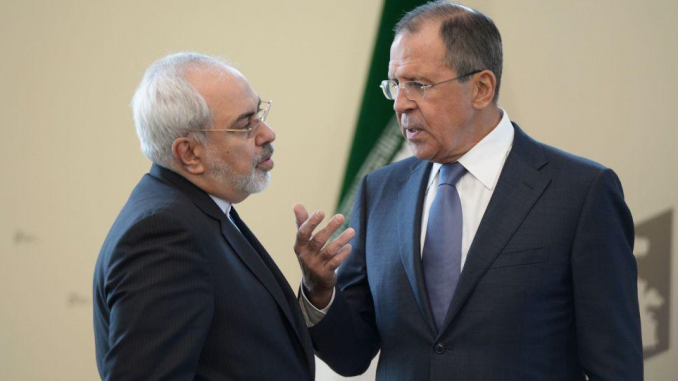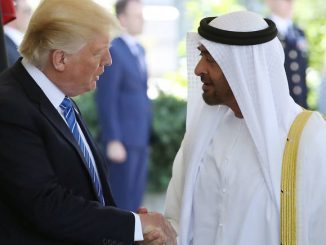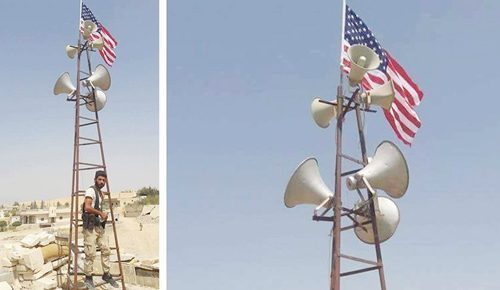
The Russian-Iranian dispute about Syria’s future which has recently started appears to be entering a new phase, as Russian Foreign Minister said Syria would have been lost without the Russian intervention, mocking the Iranian role.
Russia and Iran found a natural ally in Bashar al-Assad and his regime, and together they made an alliance to save its rule and accomplish their own agenda in the area.
Iran is seeking to widen its influence in the area and Syria was the perfect next step.
Iran in the same time supported Assad regime by money and fighters to defend his role, in return to freeing Iran’s hand in Syria to achieve its long-awaited dream. Iran started a demographic change in the Sunni-populated areas in Syria and sought to change the face of the Syrian cities by forcing the Shiite festivals in the heart of Damascus, adding Syria to the list of its controlled areas and making it gradually the 32nd Iranian province.
Russia lost most of its global power after the Soviet era, and became politically weak after the UN security council ignored its veto more than once to achieve opposing plans as in the conquer of Iraq. Russia found in Syria the chance to retrieve its place especially with Obama in the white house.
Russia sent the might of its forces to Syria and saved Assad regime from being overwhelmed by the rebels and became the real governor on the ground.
Russia’s influence in Syria made it able again to contradict the west’s strategies and forced itself again as an essential player in the global issues too.
Iran’s President Hassan Rouhani says Tehran and Moscow will continue to cooperate in the Syrian war “until the ultimate goal of eradicating terrorism and restoring peace and full security to the region is achieved.”
However, this harmony didn’t last long, as Russia’s and Iran’s interests seemed to be contradicting. Analysts say that Lavrov made his comments after being short of patience because of Iran’s militias to undermine the ceasefire in the country.
The contradicting goals
However, this alliance seems to be fragile and shaky, as the two powers have different views of Syria’s future.
The first sign of this controversy was shown in Aleppo. The military operations in Aleppo ended with a ceasefire surrender agreement.
Under this agreement, the rebels and the remaining civilians in eastern Aleppo had to leave to the rebel-held areas in Idlib. Russia wanted a political solution that saves its face in front of the global community, while Iran wanted nothing but to burn the rebels and besieged civilians to their last.
Iranian-backed militias breached the agreement and blocked the evacuation if civilians until its conditions were met. Videos were published online showing militants attacking and shooting unarmed civilians fleeing from Aleppo.
After Aleppo’s defeat, Russia said its talks with the US about Syria future has ended, and it has a new plan for Syria peace talks which can be achieved with powers that have a real effect on the Syrian ground.
Turkey used its influence over the Syrian opposition, brought them together, and made them accept a deal with the Assad regime.
Russian president Vladimir Putin then said that both the opposition and Asad regime have signed a number of documents including a ceasefire agreement between the Syrian government and the opposition, measures to monitor the ceasefire deal and a statement on the readiness to start peace talks to settle the Syrian crisis.
Putin said that three documents which open the way to solving the Syria crisis.
However, this agreement didn’t end Assad regime’s attacks on the rebel-held areas. The ceasefire were breached in Aleppo, Hama, Idlib and most notably in Damascus.
Assad regime forces backed by Hezbollah and Shia militias have launched the attack on Wadi Barada valley in rural Damascus since two weeks, with daily bombing and air raids on the area.
Rebels say the army is seeking to recapture the area, where a major spring provides most of Damascus’s water supplies and which lies on a major supply route from Lebanon to the Syrian capital used by Hezbollah.
Hezbollah also prevented Russian forces from entering the Wadi Barada area to help broker a proper deal.
The Iranian-backed militias show clearly Iran’s intention to undermine the ceasefire and the upcoming peace talks, as they don’t serve its goals for the region.
Russia needs Syria as a strong country that serves as an ally in the future. Russia wanted to use the peace talks to end in a political solution that ends the Syrian crisis and stops the war and military operations, as the more this war lasts the more Syria will be destroyed and harder to be rebuilt again.
On the contrary, Iran refuses any reconciliation between the government and the rebels. Iran wants the war to last until all the opposition forces are annihilated not caring for the destruction and lost lives. Iran needs Syria as a weak and destroyed land which will be easier to control and easier to be shaped in the future in the way that serves Iran’s goals.
Accepting the defeated share
At a news conference on Tuesday, Russian Foreign Minister Sergei Lavrov said that “The Syrian capital of Damascus was two to three weeks away from falling to terrorists when Russia intervened in support of Syrian President Bashar al-Assad”
“We’re convinced that we did what was right, when we said yes to the lawful request of the government of Syria – a UN member country whose capital was in two to three weeks from falling into the hands of terrorists. And the fact that we managed to throw the terrorists back from Damascus and help the Syrian army liberate Aleppo, I think it’s very important,” Lavrov said.
He noted that Russia’s help was essential “to keep Syria a multinational, multi-confessional, secular state, as the UN Security Council states.”
“All those who spent a year and a half silently watching IS and other militants surround Aleppo maybe committed a crime, as they breached the UN resolution, which stated that Syria should be prevented from turning into an Islamist state,” he concluded.
Later in the conference, Lavrov said Russia intends to invite the US to the peace talks.
“We’re now preparing the Astana meeting. We think it would be the right thing to invite the representatives of the UN and the new US administration to the meeting, taking into account that the meeting will take place on January 23, as planned,” Lavrov said.
He added that Russia hopes the incoming Trump administration will accept the invitation.
“We’re counting on the new [US] administration accepting this invitation and being represented by experts on any level they consider possible. It will be the first official contact during which we could begin discussing stepping up the efficiency of fighting terrorism in Syria,” Lavrov added.
The Russian ambassador to the United Nations Vitaly Churkin, has joined calls for the UN to be onboard during the Syria peace talks in Astana. According to Churkin, UN representatives could act as “moderators of contacts between the Syrian sides.”
However, Iran seemed angered by these remarks and said it rejects any participation by US representatives at the scheduled Syria peace talks in Astana.
“We are opposed to a US presence [in Astana],” Iran’s Foreign Minister Mohammad Javad Zarif is quoted as saying by the Tasnim news agency.
“We have not invited them [US], and we are against their presence,” the official added.
Lavrov comments came after Iran-backed militias sought with Assad regime to undermine the peace talks by pushing the armed opposition to freezing their participation due to Hezbollah’s breaches.
In addition, Lavrov’s comments hold a direct hint that Iran has failed in protecting Assad regime, and it should stop trying to force its conditions on Syria’s future and stop its attempts to change Syria’s demographics.
In fact, Iran failed twice in protecting Assad regime. At first, Hezbollah entered the battle directly in 2013 to bolster Assad regime, and when its power wasn’t enough other militias and Iranian forces followed. However, even those weren’t enough to tilt the power against the rebels and Assad was about to fall when Russia interfered military in September 2015.
At the same time, Russia invited Saudi Arabia, Iran’s rival, to take part in the peace talks and accepted Mohamad Alloush, who is part of the Syrian rebels and backed by Saudis, as a representative for the opposition side in the upcoming peace talks.
An official in the Syria coalition of opposition said that “The Russians uses these remarks to show their influence, their control, and the importance of their intervention, in addition to reducing Iran’s chance in playing any major role in current or future Syria.”
Michel Kilo, a prominent member o the Syrian opposition, said “Russia’s comments describe the facts. Iran failed in protecting Assad and asked Russia to support them. Now Russia says that Iran was defeated in Syria and it shouldn’t ask for something it doesn’t deserve.”
“Russia thinks that Iran shouldn’t act at it is the victor part in Syria, it should stop its attempts to undermine the peace talks, it should respect Russia’s plans for the country and most important accept the defeated share that Russia gave.”



